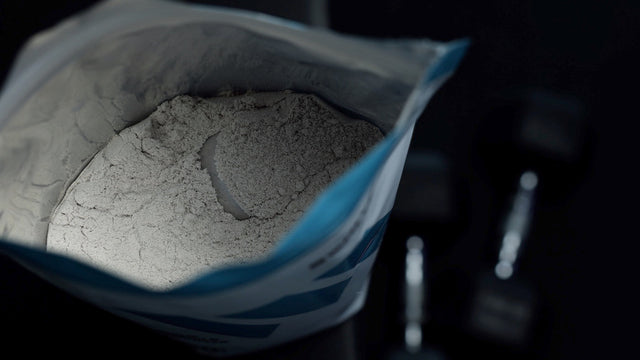As a runner, every mile counts, and the right fuel can make all the difference. Whether you're training for your first 5K or aiming for a marathon PR, pre-workout supplements can help you maximize your performance and boost your endurance. In this ultimate guide, we’ll dive into the world of pre-workout supplements tailored specifically for runners. From energy-boosting ingredients to scientifically-backed formulas, we’ll explore how these products can enhance your training sessions and race days.
Get ready to unlock your potential with the perfect pre-run boost that keeps you feeling energized, focused, and ready to conquer the miles ahead. Say goodbye to sluggishness and hello to unstoppable momentum as we break down the essentials you need to know.
Whether you’re a seasoned pro or just starting, this guide will empower you to make informed choices about your pre-workout supplement strategy, helping you to run faster, longer, and stronger than ever before.
Understanding Pre-Workout Supplements for Runners
What Are Pre-Workout Supplements?
Pre-workout supplements have become increasingly popular in the fitness world, especially among endurance athletes like runners. These supplements are specifically formulated to enhance energy, focus, and physical performance before engaging in exercise. Typically available as powders, capsules, or ready-to-drink formulas, they are consumed 30–45 minutes prior to a workout to maximize effectiveness.
For runners, pre-workouts can offer key benefits such as improved endurance, reduced fatigue, and better mental clarity—all essential for long runs, tempo workouts, or race day. The right combination of ingredients can help athletes break through plateaus and train more efficiently.
How Pre-Workout Supplements Work
The effectiveness of pre-workouts lies in how specific nutrients affect the body’s energy systems, blood flow, and muscular fatigue resistance. Science-backed ingredients like beta-alanine, creatine, BCAAs, and betaine contribute to greater stamina, delayed fatigue, and improved recovery in both aerobic and anaerobic training environments.
Each ingredient plays a unique role—some reduce lactic acid buildup, others enhance muscle hydration and cellular energy production. Understanding these compounds can help runners make more informed decisions when choosing the right pre-workout formula to support their training.
Key Ingredients in Pre-Workout Supplements
Beta-Alanine
Beta-alanine is a non-essential amino acid known for its ability to increase intramuscular carnosine levels, which helps buffer hydrogen ions and delay the onset of muscle fatigue. This is particularly helpful for runners who engage in tempo runs, intervals, or long-distance efforts where lactic acid buildup becomes a limiting factor. Regular supplementation improves endurance and time to exhaustion (Hobson et al., 2012).
Creatine
While traditionally associated with strength training, Creatine Monohydrate also supports high-intensity efforts and ATP replenishment in endurance athletes. It helps muscles recover faster and perform better during sprints, uphill running, and resistance-based cross-training sessions. Creatine monohydrate is the most researched and recommended form, proven to be safe and effective over long-term use (Kreider et al., 2017).
Betaine (Trimethylglycine)
Betaine Anhydrous is a naturally occurring compound found in foods like beets and spinach. It has gained popularity in pre-workout formulations due to its ability to enhance muscle power output, improve hydration, and support cellular function. Betaine functions as an osmolyte, helping to maintain cell volume and protect against dehydration during endurance exercise (Trexler et al., 2015). It has also been shown to improve running sprint performance and reduce markers of fatigue in trained individuals.
A standard effective dose of betaine is between 2.5 to 6 grams per day, often split pre- and post-workout. For runners, this ingredient supports performance during high-heat, long-duration efforts where muscle hydration and endurance are challenged.
Nitric Oxide Boosters (L-Citrulline)
Instead of L-arginine, modern formulations favor L-Citrulline Malate, a more bioavailable precursor to nitric oxide. Nitric oxide improves blood flow and oxygen delivery to working muscles, helping runners enhance aerobic capacity and reduce perceived effort. L-citrulline is converted in the kidneys to L-arginine, which then increases nitric oxide production more effectively than L-arginine itself (Schwedhelm et al., 2008).
Essential Amino Acids (EAAs)
Essential Amino Acids (EAAs) include all nine amino acids the body cannot produce on its own—unlike BCAAs, which only include three. EAAs play a critical role in supporting muscle protein synthesis, energy production, and recovery during and after prolonged endurance exercise.
For runners, EAAs offer superior benefits over BCAAs by supporting both performance and muscle preservation during high-volume training. Supplementing with EAAs before or during runs may help reduce muscle breakdown, minimize fatigue, and accelerate recovery, especially during caloric deficits or fasted training sessions. EAAs also help maintain a positive nitrogen balance, essential for recovery and adaptation to physical stress (Tipton & Wolfe, 2004).
For endurance athletes, a dose of 6–10 grams of EAAs either pre- or intra-workout is considered effective for maintaining muscle health and optimizing recovery.
Benefits of Pre-Workout Supplements for Runners
Improved Running Performance
Pre-workout supplements provide nutrients that support sustained energy and improved muscular endurance. This allows runners to push harder during workouts, increase training volume, and improve performance metrics like pace and time to exhaustion.
Enhanced Endurance and Hydration
Ingredients such as beta-alanine and betaine help prolong muscular endurance and support proper hydration status—both of which are vital for preventing early fatigue. Proper blood flow from nitric oxide boosters also ensures working muscles receive the oxygen they need to maintain efficiency over long distances.
Muscle Preservation and Recovery
Running places significant stress on muscles, particularly in the lower body. BCAAs and creatine help reduce muscle breakdown and improve recovery, allowing runners to train more frequently without risking overtraining or catabolism. These benefits are especially relevant for runners engaging in strength training or back-to-back training sessions.
Mental Clarity and Focus
While this version excludes caffeine, other ingredients like betaine and BCAAs may still contribute to improved neurological function and motivation by reducing markers of fatigue and supporting neurotransmitter health, creating a more focused and consistent workout experience.
Pre-workout supplements can be an excellent addition to a runner's training toolkit—provided they contain research-backed ingredients at effective doses. Understanding how each component supports performance allows athletes to personalize their supplement routine and choose products that align with their specific training needs and goals.
Look for products with transparent labels, clinically-supported dosages, and without unnecessary stimulants if you're avoiding caffeine. And as always, consult a sports nutritionist or healthcare professional before adding new supplements to your regimen.
How to Choose and Use the Right Pre-Workout Supplement
Choosing the Right Pre-Workout Supplement
With so many options available, selecting the right pre-workout supplement can feel overwhelming. To make the right choice, consider the following factors:
Identify Your Training Goals
Start by defining what you want from your supplement:
· Enhanced endurance
· Improved recovery
· Increased training intensity
· Better hydration and nutrient delivery
Knowing your goals will help you narrow down the ingredient profile that best fits your needs.
Evaluate Ingredient Transparency
Read the label carefully. Choose products that include:
· Science-backed ingredients like beta-alanine, creatine, L-citrulline, and betaine
· Full disclosure of ingredient amounts (avoid proprietary blends)
· Minimal artificial fillers, dyes, or sweeteners
Check Quality and Brand Reputation
Choose supplements from brands that:
· Follow Good Manufacturing Practices (GMP)
· Offer third-party testing and certifications
· Are transparent with sourcing and labeling
Customer reviews and athlete testimonials can also help you assess product performance and reliability.
Seek Professional Guidance
If you have pre-existing health conditions or are taking medication, consult with a healthcare provider or registered dietitian. They can help determine if the supplement is safe for you and how best to incorporate it into your routine.
Timing Your Pre-Workout Supplement Intake
The timing of your pre-workout supplement can greatly impact its effectiveness.
Recommended Timing
· Take your pre-workout 30 to 45 minutes before your run.
This window allows time for digestion and absorption so the active ingredients are effective when your workout begins.
Be Consistent
Establish a routine by taking your supplement at the same time relative to your workout. This helps your body adapt and allows you to better evaluate its impact.
Avoid Taking on an Empty Stomach
Some ingredients may cause digestive discomfort when taken without food. A light pre-run snack can help:
· Banana
· Small serving of oatmeal
· Toast with honey
Stay Hydrated
Proper hydration is critical, especially since ingredients like betaine and L-citrulline can affect fluid balance. Drink water before and during your workout to support nutrient transport and performance.
Potential Side Effects and Considerations
While pre-workout supplements are generally safe when used appropriately, they can cause side effects in some individuals.
Common Side Effects
· Beta-alanine may cause a temporary skin-tingling sensation known as paresthesia. While harmless, it can be uncomfortable for some.
o To reduce this effect, consider smaller doses or time-release formulations (Hobson et al., 2012).
· Artificial sweeteners and fillers may trigger bloating or gastrointestinal issues, especially in sensitive individuals.
o Opt for clean-label or naturally flavored products to reduce this risk.
Avoid Overuse
· Long-term reliance on pre-workouts without breaks can reduce their effectiveness due to tolerance buildup.
o To avoid this, cycle off your supplement every 4 to 8 weeks.
· Never exceed the recommended dosage, as doing so may increase the risk of side effects including cardiovascular strain and kidney stress.
Natural Alternatives to Commercial Pre-Workout Supplements
If you prefer to avoid commercial products, natural pre-workout alternatives can still provide an effective boost for your training.
Coffee with Carbohydrates
A classic, effective option:
· A cup of black coffee combined with a carbohydrate-rich snack (e.g., banana, toast)
· Provides energy and mental alertness with minimal ingredients
Beetroot Juice
Beetroot is high in nitrates, which convert to nitric oxide and support:
· Improved oxygen delivery
· Increased endurance
· Reduced fatigue
Research suggests that consuming 500 mL about 60 minutes before exercise can improve aerobic performance (Bailey et al., 2009).
Whole-Food Pre-Workout Smoothie
Blend together nutrient-dense ingredients for a natural and balanced pre-workout option:
· Spinach (nitrates for blood flow)
· Banana (carbs and potassium)
· Protein powder (essential amino acids for recovery)
This combination supports both performance and post-run muscle maintenance using real food sources.
Pre-Workout Supplement Myths Debunked
Myth 1: More Is Better
One of the most common misconceptions about pre-workout supplements is that taking more will yield better results. In reality, exceeding the recommended dosage can increase the risk of side effects—such as digestive issues, dehydration, or even cardiovascular strain—without providing any additional performance benefit.
· Why it’s a myth: The body has a threshold for how much it can absorb and use effectively.
· The truth: Following the manufacturer’s suggested serving size ensures safety and allows the ingredients to work as intended.
Overconsumption can lead to tolerance buildup and may reduce the effectiveness of the supplement over time. Stick to clinically dosed, evidence-backed formulations and cycle off periodically to maintain sensitivity.
Myth 2: Pre-Workouts Are Only for Bodybuilders
Another widespread myth is that pre-workout supplements are designed exclusively for bodybuilders or strength athletes. While these products are popular in the bodybuilding community, they offer benefits across a wide range of sports and training styles—including endurance-based disciplines like running.
· Ingredients such as beta-alanine, betaine, creatine, and L-citrulline support muscular endurance, hydration, and improved oxygen delivery.
· These effects can enhance long-distance runs, interval training, and race-day performance, making pre-workouts just as valuable for runners as they are for gym-goers.
The key is choosing the right formulation based on your goals—not your training style alone.
Myth 3: Pre-Workout Replaces Nutrition and Training
Perhaps the most harmful myth is the idea that pre-workout supplements can make up for poor nutrition, inconsistent training, or lack of sleep. While they may offer a temporary performance boost, they are not a substitute for a solid foundation of fitness.
· Supplements are just that—a supplement to your training and nutrition, not a shortcut.
· Without proper hydration, a balanced diet, and regular exercise, even the best pre-workout formula will yield limited results.
Think of pre-workouts as a performance enhancer only when the rest of your lifestyle is already dialed in.
Conclusion: Elevate Your Running Performance with the Right Supplement
In conclusion, pre-workout supplements can be a valuable tool for runners looking to enhance their performance and achieve their fitness goals. By understanding the key ingredients and their benefits, you can make informed choices about what to include in your pre-workout regimen. Whether you're seeking an energy boost, improved endurance, or better recovery, there's a supplement that can help you get the most out of your runs.
Choosing the right supplement involves careful consideration of your individual needs, goals, and potential sensitivities. It's important to select high-quality products from reputable brands and to consult with healthcare professionals as needed. Timing your supplement intake correctly and being mindful of potential side effects can further optimize your experience. For those who prefer a natural approach, there are plenty of effective alternatives that can provide similar benefits.
Ultimately, the goal is to find a pre-workout strategy that enhances your running experience and supports your overall health and fitness. By debunking common myths and learning from the experiences of other runners, you can confidently incorporate pre-workout supplements into your routine. With the right approach, you can boost your miles and achieve new levels of performance, making each run more enjoyable and rewarding.
Conclusion: Elevate Your Running Performance with Swolverine Pre-Workout
Pre-workout supplements can be a game-changer for runners aiming to enhance endurance, focus, hydration, and recovery. When used correctly and consistently, they help you push past plateaus and perform at your peak. But not all supplements are created equal—which is why choosing a high-quality, well-formulated product is essential.
Swolverine’s PRE is designed specifically with athletic performance in mind. Formulated with research-backed ingredients like beta-alanine, L-citrulline malate, betaine anhydrous, and coconut water powder, it supports sustained energy, optimal hydration, and reduced fatigue—without the crash. With no proprietary blends, artificial dyes, or unnecessary fillers, Swolverine delivers full transparency and clinical dosing so you know exactly what you’re putting into your body.
Whether you're training for a race, working on speed, or simply aiming to enjoy longer, stronger runs, Swolverine’s pre-workout is built to help you fuel with purpose. It’s more than just a supplement—it’s a performance tool for serious runners and endurance athletes.
By understanding how pre-workout supplements work, debunking common myths, and timing your intake properly, you can make confident, informed decisions. Choose quality. Choose transparency. Choose Swolverine—and take your running to the next level.







